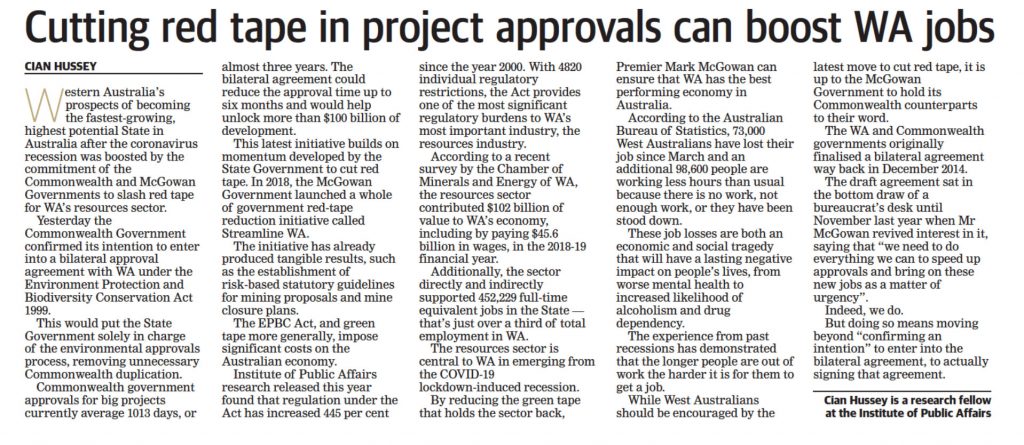
Article by Cian Hussey courtesy of the West Australian
Western Australia’s prospects of becoming the fastest-growing, highest potential State in Australia after the coronavirus recession was boosted by the commitment of the Commonwealth and McGowan Governments to slash red tape for WA’s resources sector.
Yesterday the Commonwealth Government confirmed its intention to enter into a bilateral approval agreement with WA under the Environment Protection and Biodiversity Conservation Act 1999.
This would put the State Government solely in charge of the environmental approvals process, removing unnecessary Commonwealth duplication.
Commonwealth government approvals for big projects currently average 1013 days, or almost three years. The bilateral agreement could reduce the approval time up to six months and would help unlock more than $100 billion of development.
This latest initiative builds on momentum developed by the State Government to cut red tape. In 2018, the McGowan Government launched a whole of government red-tape reduction initiative called Streamline WA.
The initiative has already produced tangible results, such as the establishment of risk-based statutory guidelines for mining proposals and mine closure plans.
The EPBC Act, and green tape more generally, impose significant costs on the Australian economy.
Institute of Public Affairs research released this year found that regulation under the Act has increased 445 per cent since the year 2000. With 4820 individual regulatory restrictions, the Act provides one of the most significant regulatory burdens to WA’s most important industry, the resources industry.
According to a recent survey by the Chamber of Minerals and Energy of WA, the resources sector contributed $102 billion of value to WA’s economy, including by paying $45.6 billion in wages, in the 2018-19 financial year.
Additionally, the sector directly and indirectly supported 452,229 full-time equivalent jobs in the State — that’s just over a third of total employment in WA.
The resources sector is central to WA in emerging from the COVID-19 lockdown-induced recession.
By reducing the green tape that holds the sector back, Premier Mark McGowan can ensure that WA has the best performing economy in Australia.
According to the Australian Bureau of Statistics, 73,000 West Australians have lost their job since March and an additional 98,600 people are working less hours than usual because there is no work, not enough work, or they have been stood down.
These job losses are both an economic and social tragedy that will have a lasting negative impact on people’s lives, from worse mental health to increased likelihood of alcoholism and drug dependency.
The experience from past recessions has demonstrated that the longer people are out of work the harder it is for them to get a job.
While West Australians should be encouraged by the latest move to cut red tape, it is up to the McGowan Government to hold its Commonwealth counterparts to their word.
The WA and Commonwealth governments originally finalised a bilateral agreement way back in December 2014.
The draft agreement sat in the bottom draw of a bureaucrat’s desk until November last year when Mr McGowan revived interest in it, saying that “we need to do everything we can to speed up approvals and bring on these new jobs as a matter of urgency”.
Indeed, we do.
But doing so means moving beyond “confirming an intention” to enter into the bilateral agreement, to actually signing that agreement.
Cian Hussey is a research fellow at the Institute of Public Affairs
